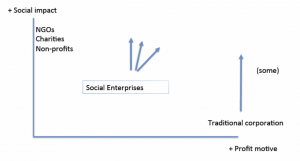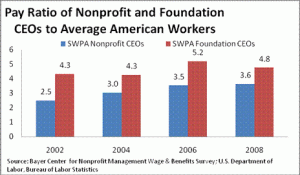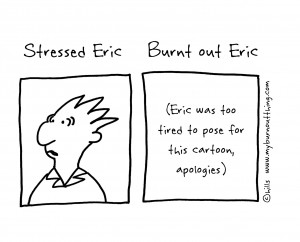 Unlike social enterprises and traditional companies that generate revenues and profit, non-profit organizations rely on donations and have a high focus on social returns. They strive to create meaningful changes in the world and to assist those who need help. However, as Andi Grace writes on their blog, they can also be toxic work environments.
Unlike social enterprises and traditional companies that generate revenues and profit, non-profit organizations rely on donations and have a high focus on social returns. They strive to create meaningful changes in the world and to assist those who need help. However, as Andi Grace writes on their blog, they can also be toxic work environments.
 I was fascinated by their description of ‘activist burnout’ and the unreasonable expectations they faced throughout her experience working at non-profit organizations. Non-profit workers often compete for a small number of underpaid or unpaid positions and they are expected to work long hours and carry an excessive workload simply because of the nature of their work. Just because it is charitable work does not mean that employers should expect workers to accept a salary that does not allow them to cover their own basic needs.
I was fascinated by their description of ‘activist burnout’ and the unreasonable expectations they faced throughout her experience working at non-profit organizations. Non-profit workers often compete for a small number of underpaid or unpaid positions and they are expected to work long hours and carry an excessive workload simply because of the nature of their work. Just because it is charitable work does not mean that employers should expect workers to accept a salary that does not allow them to cover their own basic needs.
They also bring up a case where “clueless upper management demand[ed] something happen in a way that [made] no sense, and [ignored] the very legitimate wisdom of front line workers”. Andi brings up an example where their supervisors were so focused on quantitative outputs and the bottom line that they neglected to consider the holistic effects of their efforts. When gathering signatures for a petition, their manager demanded that the time to gather each signature be reduced.
However, the cost of this perceived efficiency meant a lack of meaningful connection and education to adequately explain to people what the petition was about. The people on the ground are generally paid less yet they often have the best understanding of how the programs function and affect the people they are meant to assist. The complexities of this bureaucratic hierarchy and power structures stands in the way of progress and improving the social impact of their work.
**NOTE** I used “they” when referencing Andi since that is their preferred pronoun
Cooper, Garrett. “Lessons on How Non-Profits Can Behave More Like For-Profits.” Bayer Centre for Non-Profit Management. Robert Morris University. Web. 28 Oct. 2015.
Grace, Andi. “I QUIT! Naming Toxicity in Non-profit Work Environments.” Andi Grace. Web. 29 Oct. 2015. <http://andigracewrites.com/2015/10/i-quit-naming-toxicity-in-non-profit-work-environments/>.


